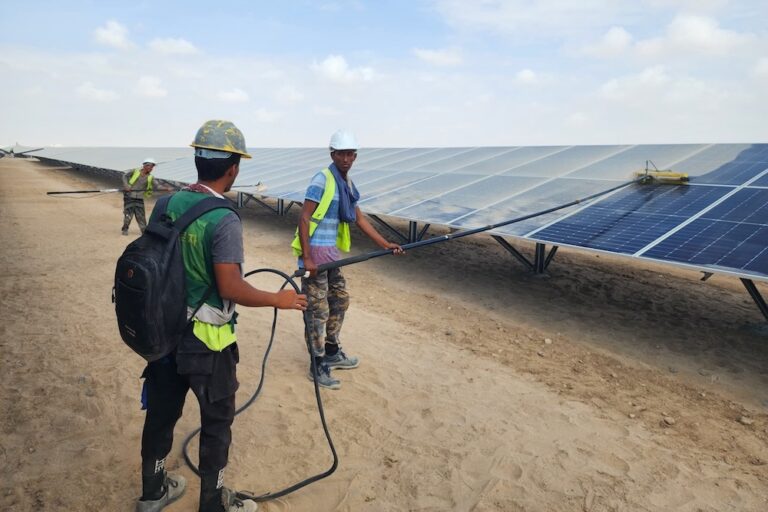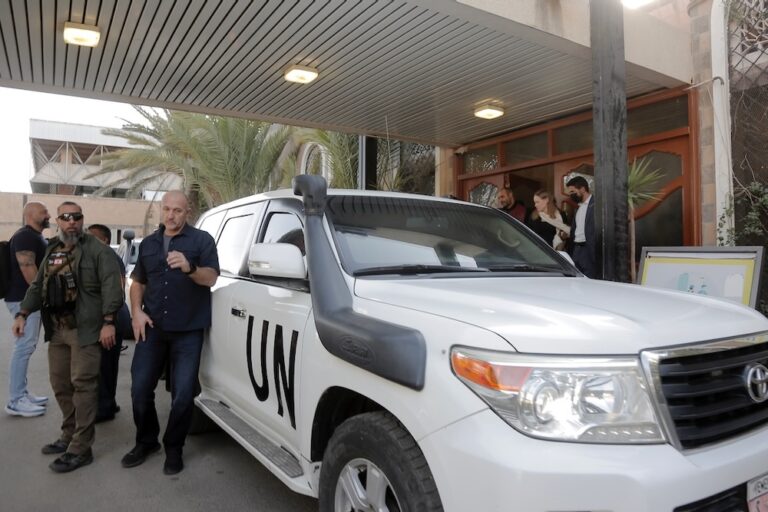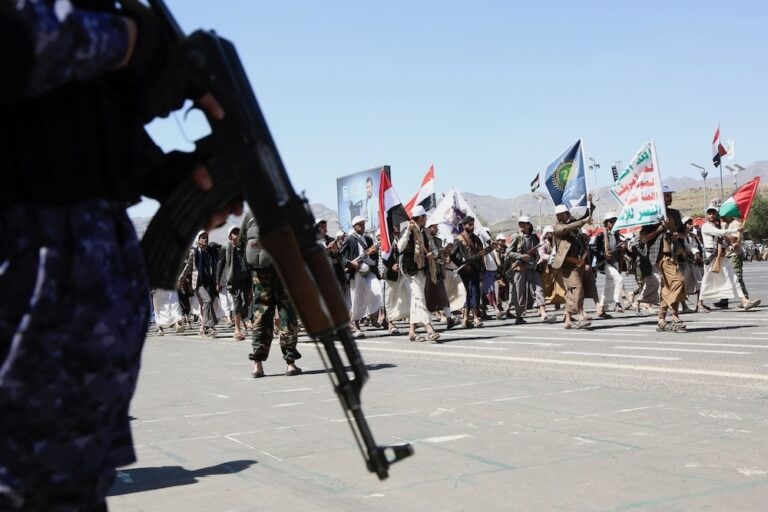The following is a 3 April 2000 CPJ press release: CPJ Urges President Clinton to Raise Press Freedom Concerns with Yemeni Leader New York, April 3, 2000 – The Committee to Protect Journalists (CPJ) urges U.S. president Bill Clinton to put press freedom high on the agenda for his meeting with Yemeni president Ali Abdullah […]
The following is a 3 April 2000 CPJ press release:
CPJ Urges President Clinton to Raise Press Freedom Concerns with Yemeni Leader
New York, April 3, 2000 – The Committee to Protect Journalists (CPJ) urges U.S. president Bill Clinton to put press freedom high on the agenda for his meeting with Yemeni president Ali Abdullah Saleh in Washington tomorrow.
Since the end of Yemen’s 1994 civil war, the Yemeni government has followed the repressive example of its regional neighbors by steadily restricting the extensive press freedoms granted to local journalists following the unification of north and south Yemen in 1990. Last year, the government carried out a number of punitive measures against journalists, including arrests, prosecutions, censorship, and acts of intimidation.
This year has already seen new cases of censorship and harassment of local media. On February 22, a Sanaa court ordered the 30-day suspension of the opposition weekly Al-Wahdawi and permanently banned Al-Wahdawi contributor Jamal Amer from practicing journalism in Yemen. Amer had been charged with harming public interests, offending King Fahd of Saudi Arabia, and damaging relations between Saudi Arabia and Yemen, based on an August 10, 1999 column in which he analyzed alleged power struggles within the Saudi royal family during the summer of 1999, and predicted that they would negatively affect the ongoing Yemeni-Saudi border dispute. Both sentences have been suspended pending appeal.
In September 1999, the opposition weekly Al-Shoura was indefinitely closed by court order for allegedly printing two separate versions of the same edition in violation of the law. The newspaper accused state security agents of printing the second edition themselves as a subterfuge. In October, the opposition weekly Al-Haq was suspended for 30 days for running an article that criticized administrative practices in southern Yemen. And on March 7, 2000, judicial authorities summoned the editor of the independent thrice-weekly paper Al-Ayyam for questioning about Al-Ayyam’s published criticisms of authorities. He faces possible prosecution.
“The Yemeni government’s targeting of independent and opposition journalists shows a worrying indifference to press freedom,” said CPJ executive director Ann Cooper. “President Saleh’s visit to Washington is the perfect opportunity for the Clinton administration to voice its concern about the deterioration of press freedoms in Yemen, particularly in light of efforts to improve bilateral relations in recent years.”
CPJ’s Yemen country summary for 2000, excerpted from its annual report Attacks on the Press in 1999, is appended below.
**********************************************
YEMEN
(From Attacks on the Press in 1999)*
During the heady days following the unification of North Yemen and South Yemen in 1990, there was a remarkable proliferation of private newspapers and a new vigor in public discourse. In recent years, however, the Yemeni government has been following the repressive example of its regional
neighbors. Although Yemen still boasts one of the freest and liveliest presses in the region, authorities have been steadily increasing their pressure on independent and opposition journalists since 1994, when civil war broke out between north and south.
As Yemenis geared up for the country’s first ever presidential election, in September, authorities carried out a number of punitive measures against journalists, including arrests, prosecutions, censorship, and acts of intimidation. In the first three months of the year, three journalists were detained and held for varying periods. Others were summoned for questioning by prosecutors or security agents. During the year, at least seven newspapers stood trial for alleged press offenses in what some journalists described as an attempt by authorities to muzzle criticism in advance of the September election.
Yemen’s press law and penal code give authorities sweeping powers to prosecute journalists on vague charges such as offending “the State, the Cabinet, or parliamentary institutions” and publishing “false information” that “threatens public order or the public interest.”
In one of the year’s most prominent cases, editor Hisham Basharaheel and writer Ali Haitham Ghareeb of the prominent Aden-based paper Al-Ayyam were charged with “instigating national feuds,” “instigating the spirit of separatism,” and “harming national unity.” The charges stemmed from an opinion column written by Ghareeb that criticized what he described as northern political hegemony over southern provinces. In August, the journalists were handed suspended prison terms of six and 10 months, respectively. However, the court rejected the prosecutor’s bid to close the newspaper.
On several occasions, authorities resorted to censorship to silence opposition and foreign newspapers. In late February, successive issues of the opposition weekly Al-Shoura were banned on the pretext that two separate editions of the paper were being published in violation of the law. And on February 27, authorities temporarily banned distribution of the London-based daily Al-Sharq al-Awsat, apparently because of an article on Russian arms sales to Yemen and the prospect of Yemeni arms transfers to Eritrea.
Beyond prosecutions and censorship, journalists continued to complain of extralegal harassment, such as the interruption of their phone lines, surveillance, and intimidation by security agents.
In July, CPJ vice chairman Terry Anderson traveled to Yemen to express CPJ’s concerns to government officials. He met with Prime Minister Abdel Karim al-Iryani, who declared that harassment and threats against journalists are “abhorrent to our laws and ideals” and should be condemned. The prime minister promised to investigate any cases reported to him. “We are committed to freedom of the press,” Prime Minister al-Iryani told Anderson. “We are ready to listen to any report of a violation and ready to take action….We highly condemn harassment and threats against journalists.”
Still, al-Iryani said his government would continue to file court cases against journalists and newspapers that publish what he referred to as lies. He also refused to promise an end to censorship of foreign publications entering the country, saying that such censorship occurs mainly for ethical rather than political reasons.
In the ensuing months, government censorship of local papers intensified. Just before the country’s September 23 presidential election, the Ministry of Information ordered the closure of the opposition weekly Al-Shoura. A few weeks later, a court imposed a one-month suspension on the opposition weekly Al-Haq after it ran an article that criticized the government.
In one positive development, the weekly Al-Rai al-Aam was allowed to resume publication in May after a six-month ban (incurred because of an article that criticized Saudi Arabia). President Saleh reportedly reversed the ban after the paper’s editor appealed to him in person at a ceremony commemorating Yemen’s 1990 unification.
TV and radio continue to serve as crucial sources of news and information in Yemen, which suffers from one of the region’s highest illiteracy rates. Yet no private broadcast outlets exist. According to newspaper reports, authorities over the past two years have rejected at least three requests to set up private radio and television stations, citing the lack of a regulatory framework. In 1998, Minister of Information Abdel Rahman al-Akwa’a said the government was “formulating the legal bases” to
regulate the licensing of private stations, but in 1999 the government showed no sign that it was ready or willing to share the airwaves.
On June 2, Yemen lost one of its finest and most courageous journalists when Dr. Abdul Aziz al-Saqqaf was killed in a traffic accident while crossing a street in the capital, Sanaa. The founder and editor of the English-language weekly Yemen Times, Dr. al-Saqqaf was a leading force in Yemeni journalism over the years and a powerful voice in defense of press freedom.
To view documented cases of attacks on the press in Yemen, visit CPJ’s web site at http://www.cpj.org/attacks99/mideast99/Yemen.html


